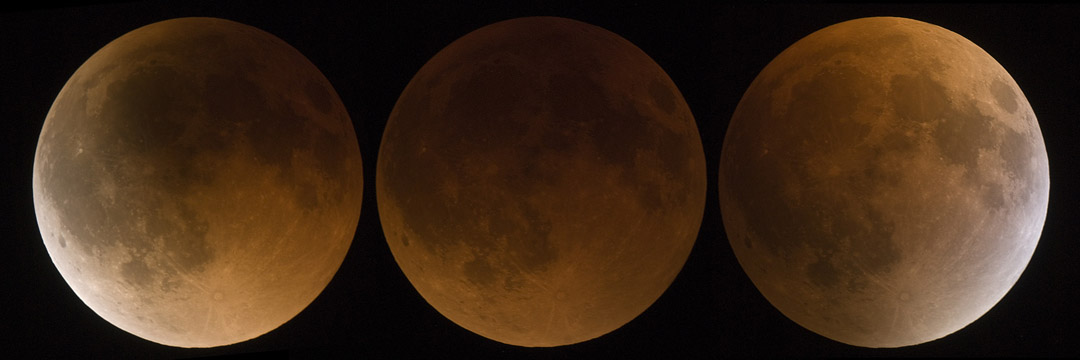
images by Gary Seronik
When Gerard Kuiper used to observe Mars with the McDonald 82″ telescope he would compare it to a paint company color chart so he could precisely identify the shades of red. I don’t have a paint chart but the southern highlands in Gary’s eclipsed Moon from August 28 look like its between opaque coral and light brown according to an online T-shirt color chart. But we don’t have to rely on eyeball matches of color, we can use the eyedropper tool in Photoshop to suck up samples of color. I find the Walter area of the Great Peninsula has RGB values of 69, 37, 13. Oceanus Procellarum is 59, 32, 11, and Frigoris is 39, 18, 13. These are more boring descriptors than “opaque coral” but they provide more insight. The R value is the largest for all of these, confirming our view that the eclipse color is some version of a red hue. There is little B in the images - its always a low value. This is the correct way to measure hues of the Moon, eclipsed or not, but there are calibrations and corrections to be made if we want to be precise. What was the sensitivity of Gary’s camera, the transparency of the air, and the effect of his Photoshop manipulations? Astronomers who study the very subtle colors of the Moon calibrate by matching the color values they see at a standard site such as an Apollo landing spot, with a ground up sample of soils from the spot that have been measured in a laboratory. To do it right is hard - that’s probably why we normally just use the estimated Danjon scale to characterize eclipse color and darkness.
Technical Details:
Nikon D200 hooked up to a homebuilt 8-inch f/4.2 reflector. Each image is a 5 second exposure at ISO 400. Minimal processing in Photoshop.
Related Links:
Eclipse details
Amateur color photometry of the Moon
Another view of the eclipse
Yesterday's LPOD: A Whole New Moon
Tomorrow's LPOD: Remembering Galileo
COMMENTS?
Register, Log in, and join in the comments.



